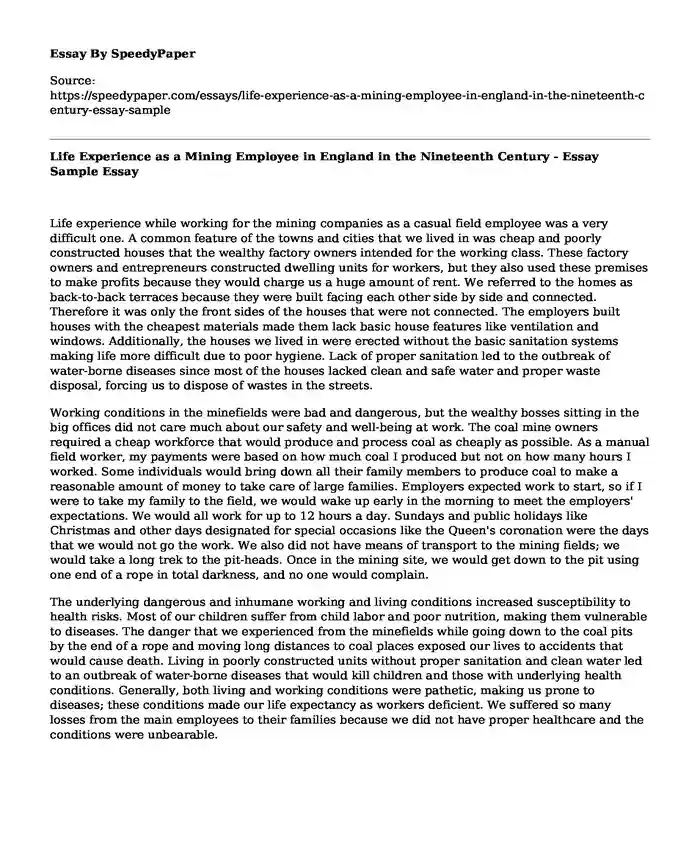
| Essay type: | Narrative essays |
| Categories: | Employment Personal experience |
| Pages: | 2 |
| Wordcount: | 531 words |
Life experience while working for the mining companies as a casual field employee was a very difficult one. A common feature of the towns and cities that we lived in was cheap and poorly constructed houses that the wealthy factory owners intended for the working class. These factory owners and entrepreneurs constructed dwelling units for workers, but they also used these premises to make profits because they would charge us a huge amount of rent. We referred to the homes as back-to-back terraces because they were built facing each other side by side and connected. Therefore it was only the front sides of the houses that were not connected. The employers built houses with the cheapest materials made them lack basic house features like ventilation and windows. Additionally, the houses we lived in were erected without the basic sanitation systems making life more difficult due to poor hygiene. Lack of proper sanitation led to the outbreak of water-borne diseases since most of the houses lacked clean and safe water and proper waste disposal, forcing us to dispose of wastes in the streets.
Working conditions in the minefields were bad and dangerous, but the wealthy bosses sitting in the big offices did not care much about our safety and well-being at work. The coal mine owners required a cheap workforce that would produce and process coal as cheaply as possible. As a manual field worker, my payments were based on how much coal I produced but not on how many hours I worked. Some individuals would bring down all their family members to produce coal to make a reasonable amount of money to take care of large families. Employers expected work to start, so if I were to take my family to the field, we would wake up early in the morning to meet the employers' expectations. We would all work for up to 12 hours a day. Sundays and public holidays like Christmas and other days designated for special occasions like the Queen's coronation were the days that we would not go the work. We also did not have means of transport to the mining fields; we would take a long trek to the pit-heads. Once in the mining site, we would get down to the pit using one end of a rope in total darkness, and no one would complain.
The underlying dangerous and inhumane working and living conditions increased susceptibility to health risks. Most of our children suffer from child labor and poor nutrition, making them vulnerable to diseases. The danger that we experienced from the minefields while going down to the coal pits by the end of a rope and moving long distances to coal places exposed our lives to accidents that would cause death. Living in poorly constructed units without proper sanitation and clean water led to an outbreak of water-borne diseases that would kill children and those with underlying health conditions. Generally, both living and working conditions were pathetic, making us prone to diseases; these conditions made our life expectancy as workers deficient. We suffered so many losses from the main employees to their families because we did not have proper healthcare and the conditions were unbearable.
Cite this page
Life Experience as a Mining Employee in England in the Nineteenth Century - Essay Sample. (2024, Jan 19). Retrieved from https://speedypaper.net/essays/life-experience-as-a-mining-employee-in-england-in-the-nineteenth-century-essay-sample
Request Removal
If you are the original author of this essay and no longer wish to have it published on the SpeedyPaper website, please click below to request its removal:
- Laws of Demand and Supply - Free Essay in Economics
- Essay Example on Famous Killer in Canada: Allan Legere
- Free Essay Example Dedicated to Jim Carrey
- Free Paper Sample on a Feminist Overview of the Salem Witch Trials
- Essay Example. French Empire's Religious Legacy and Its Influence on Contemporary Transnational Relations
- Free Essay Example - Motivation Results
- Free Essay Example: Pre-Employment Drug Testing
Popular categories




